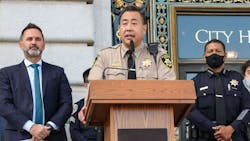San Francisco Stores Can Hire Off-Duty Deputies to Battle Retail Theft
San Francisco sheriff's deputies can soon get paid time and a half by private retailers to guard against shoplifting while off duty, similar to police officers, amid a push to combat retail theft in the city.
State law only allows the sheriff to provide supplemental law enforcement to private entities for "special events or occurrences that happen on an occasional basis." The sheriff would approve each request.
Sheriff Paul Miyamoto, Police Chief Bill Scott and Supervisor Ahsha Safaí, who introduced the legislation to authorize deputies as private guards for certain occasions, announced an agreement on the steps of City Hall Tuesday after more than two months of negotiations with the police union, which originally opposed the idea, arguing deputies don't have the same training as police officers.
Following the announcement of the agreement, the legislation passed the Board of Supervisors 7-3, with Supervisors Dean Preston, Shamann Walton and Hillary Ronen dissenting. Supervisor Myrna Melgar was absent.
"This is a great opportunity for us to help with keeping our communities safe," Miyamoto said. "I appreciate the fact that we are now going to be a little more hopeful that we can assist in increasing the feeling of safety and the quality of care that we provide as public safety entities."
The legislation comes as elected officials turn to law enforcement to crack down on retail theft amid viral shoplifting incidents, such as the groups of thieves who ransacked Union Square stores the weekend before Thanksgiving. San Francisco's retail theft incidents have also prompted debates about reliance on law enforcement and equity for smaller retailers who might not be able to pay for this privilege and protection.
The data around the trends is murky. Retail theft reports dropped sharply under pandemic lockdown and then rose slowly as the city reopened.
A spike in September was attributed to one store's reporting methodology, although not all crimes are reported. Representatives from Walgreens and CVS have called San Francisco an "epicenter" of retail crime and said they closed stores due to "rampant shoplifting," but specific police data did not support that claim. Regardless, recent incidents have unnerved residents and soured public perception.
Under the proposed legislation, around 800 sheriff's deputies could be eligible to sign up for voluntary overtime while in uniform. Retailers would pay for their services and agree to not hold the city liable if anything were to go wrong.
About 2,000 police officers are already able to do the same, but Scott said Tuesday that the department "was unable to meet the demand."
"Retail theft is a huge, huge problem in our city," Scott said. "We're doing everything possible to make it better."
The supervisors who opposed the measure questioned its legality, impact on city staffing and over-reliance on law enforcement.
Preston said the legislation was illegal under a state law that only allows for private entities to contract peace officers "on an occasional basis," a point raised in a letter from USF law professor Lara Bazelon to supervisors. Safaí and a deputy city attorney said that the ordinance was drafted to comply with state law and the sheriff would have to review each request to make sure it didn't step beyond an occasional occurrence.
Walton said he wasn't comfortable approving a new measure with the sheriff's department while the city was appointing an oversight board and inspector general for the department. He also invoked the names of Black people killed by law enforcement.
"We need to stop thinking that every response to every crime is more law enforcement with guns," he said.
Safaí argued that the legislation wasn't meant "to incarcerate our way out of this problem."
"It's meant to be a deterrent. It's meant to be more eyes and ears on the street," he said. "If it does become violent, like it did in Union Square on Nov. 19, our peace officers will be ready."
Ronen expressed concern about understaffing at the sheriff's department, worsened by the vaccine mandate. Miyamoto said that the program would not affect staffing since it would be voluntary overtime.
The sheriff and police chief will work over the next two months to create a memorandum of understanding and return to report to the Board, Safaí said.
Business owners, the retail workers' union and Rev. Amos Brown, president of the San Francisco NAACP, support the measure. Vikram Gupta, a Pacific Heights resident for 22 years, also backed the idea, arguing the city is responsible for addressing crime.
"It's reached a point where it's unacceptable," he told The Chronicle. "Businesses shouldn't be having to pay for their own security. We shouldn't have this problem."
___
(c)2021 the San Francisco Chronicle
Visit the San Francisco Chronicle at www.sfchronicle.com
Distributed by Tribune Content Agency, LLC.
